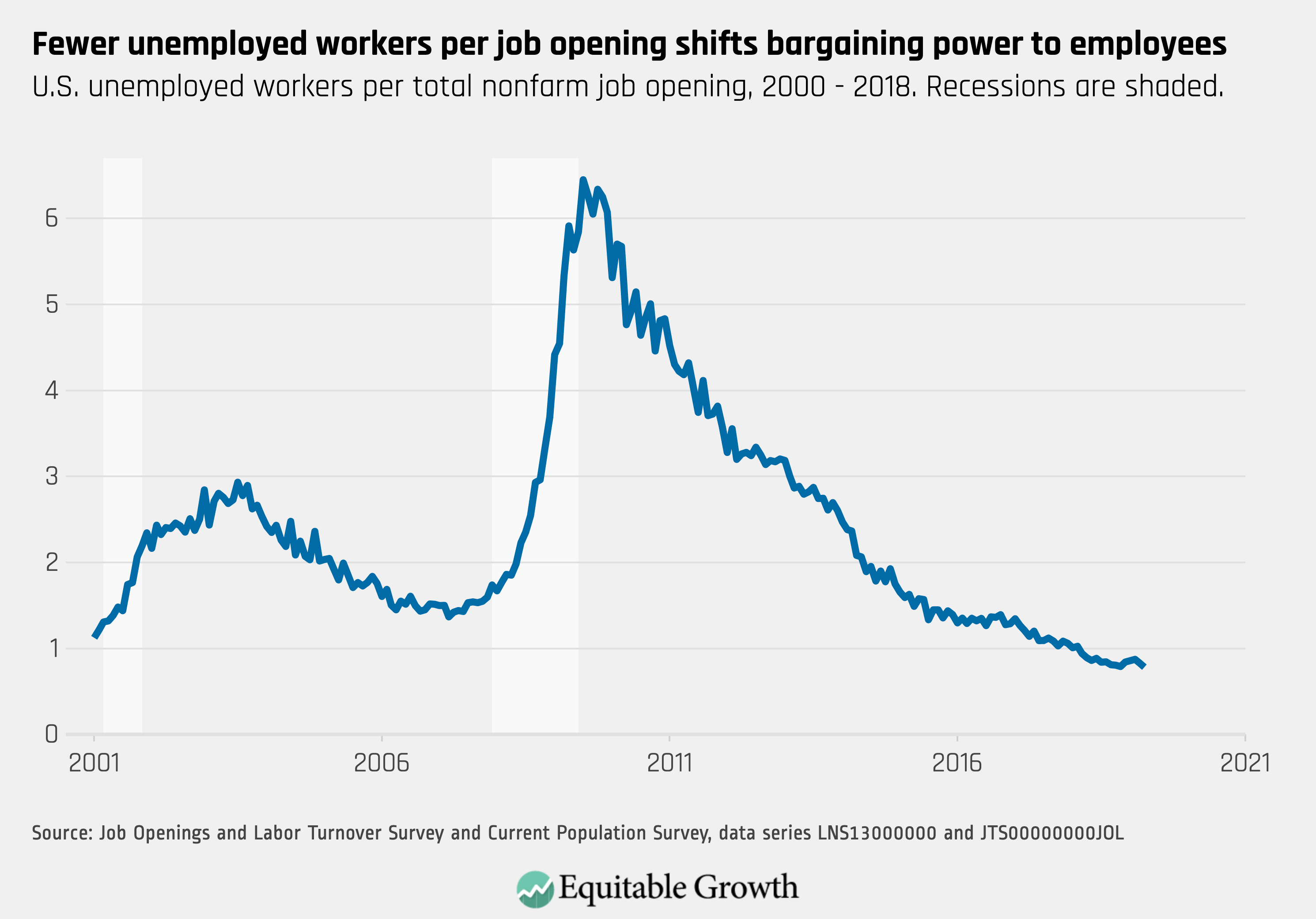Weekend reading: “Inequality on the rise, recession on the horizon?” edition
This is a weekly post we publish on Fridays with links to articles that touch on economic inequality and growth. The first section is a round-up of what Equitable Growth published this week and the second is the work we’re highlighting from elsewhere. We won’t be the first to share these articles, but we hope by taking a look back at the whole week, we can put them in context.
Equitable Growth round-up
Senior Director for Family Economic Security Elisabeth Jacobs introduced a new comprehensive report for Equitable Growth by Columbia University economist Jane Waldfogel and MPH student Emma Liebman on family care leave, which they emphasize includes, but is not limited to, parental care leave. Waldfogel and Liebman review the evidence on the advantages and costs of family care leave and argue that there is an urgent need for policy change to help Americans remain afloat while caring for seriously ill loved ones.
Economist Kate Bahn and Research Assistant Raksha Kopparam produced our monthly data analysis on the Job Openings and Labor Turnover Survey, or JOLTS, from the U.S. Bureau of Labor Statistics. While these figures document one of the tightest labor markets of this century, improvements in recent months have been marginal, begging the question of whether there remains any slack for further tightening.
Research Assistant Somin Park discussed the findings of a new paper on heterogeneous returns to wealth by economists Andreas Fagereng of Statistics Norway, Luigi Guiso of the Einaudi Institute for Economics and Finance, Davide Malacrino of the International Monetary Fund, and Equitable Growth grantee Luigi Pistaferri. Among other findings, Park highlights that risk compensation is insufficient to explain the substantially higher returns to wealth for the wealthiest taxpayers and mentions potential implications of this paper for future research and tax policy.
Park also penned a blog this week on new research from IMF economists Jonathan D. Ostry, Prakash Loungani, and Davide Furceri on the importance of distributional considerations in economic policymaking. In particular, the authors argue that policies that reduce inequality can strengthen growth and social cohesion, and they focus on the negative impacts of capital market liberalization and excessive fiscal consolidation on inequality in many contemporary economies.
In his weekly Worthy Reads column, Brad DeLong provides his take on recent research and writing in macroeconomics. While DeLong links to Bahn and Kopparam’s analysis showing a persistently tight labor market, he also notes that bond markets are increasingly concerned about a recession in the not-too-distant future.
In honor of Fathers’ Day, Equitable Growth released a working paper today on some unexpected benefits of workplace flexibility for fathers. The paper by economists Petra Persson and Maya Rossin-Slater at Stanford University leverages a difference-in-differences regression discontinuity design to show that postpartum and mental health improved for mothers whose male partners had access to an intermittent paid leave policy in Sweden. Equitable Growth also published a blog summarizing these finding in the context of other research and policy debates.
Links from around the web
Jeff Sommer wrote a column in The New York Times to mark 10 years of growth without a recession in the United States. Despite this positive momentum, Sommer points out that the economy faces headwinds in the form of trade wars, dramatic inequality, and other uncertainties—all of which have been reflected in inverted bond yields, sluggish job growth last month, and uneasy futures markets. [nyt]
Despite having experienced a decade of economic expansion, Sarah Foster of Bankrate summarized recent survey evidence that many Americans have yet to recover to their previous financial situations. Specifically, the survey data from Bankrate shows that 25 percent of Americans report having experienced no improvement from their prerecession financial state, while 23 percent of respondents reported that their circumstances have worsened. [bankrate]
Also in The New York Times, Jenna Smialek reports on the research and advocacy efforts of a new group, Employ America, to encourage the Federal Reserve to pursue loose monetary policy. From Employ America’s perspective, this is the most effective means of maintaining employment and encouraging wage growth for disadvantaged workers as the economy begins to show signs of weakness. The founder of the group, Sam Bell, notes in the article that these efforts are aimed at changing the mindset of monetary policymakers to have an inequality-conscious response through the next recession and expansion—and beyond. [nyt]
In Reuters, Edward Hadas likewise offers policy recommendations for more innovative fiscal and monetary responses to the next recession. Hadas argues that central bankers should shift their focus exclusively from setting the right policy interest rates to engaging in effective lending that increases capital investments and job creation in the real economy, as opposed to simply inflating financial asset prices. On the other hand, Hadas posits that federal politicians should look to jumpstart private activity and consumer demand by enacting certain tax changes (including potential job creation incentives), making effective public investments, and providing debt relief (especially for low-income workers). [reuters]
Friday Figure

Figure is from Equitable Growth’s,“JOLTS Day Graphs: April 2019 Report Edition.”

